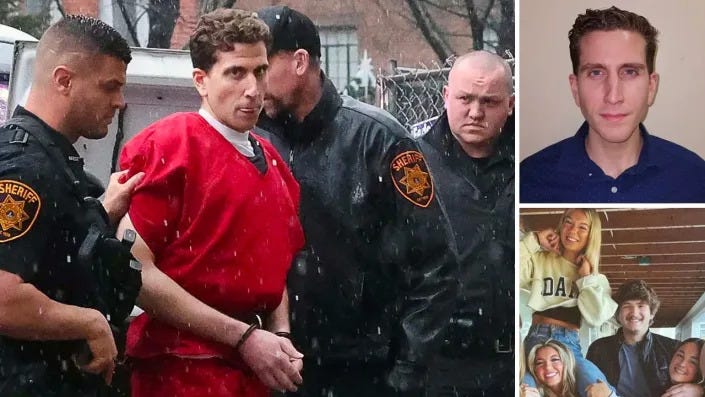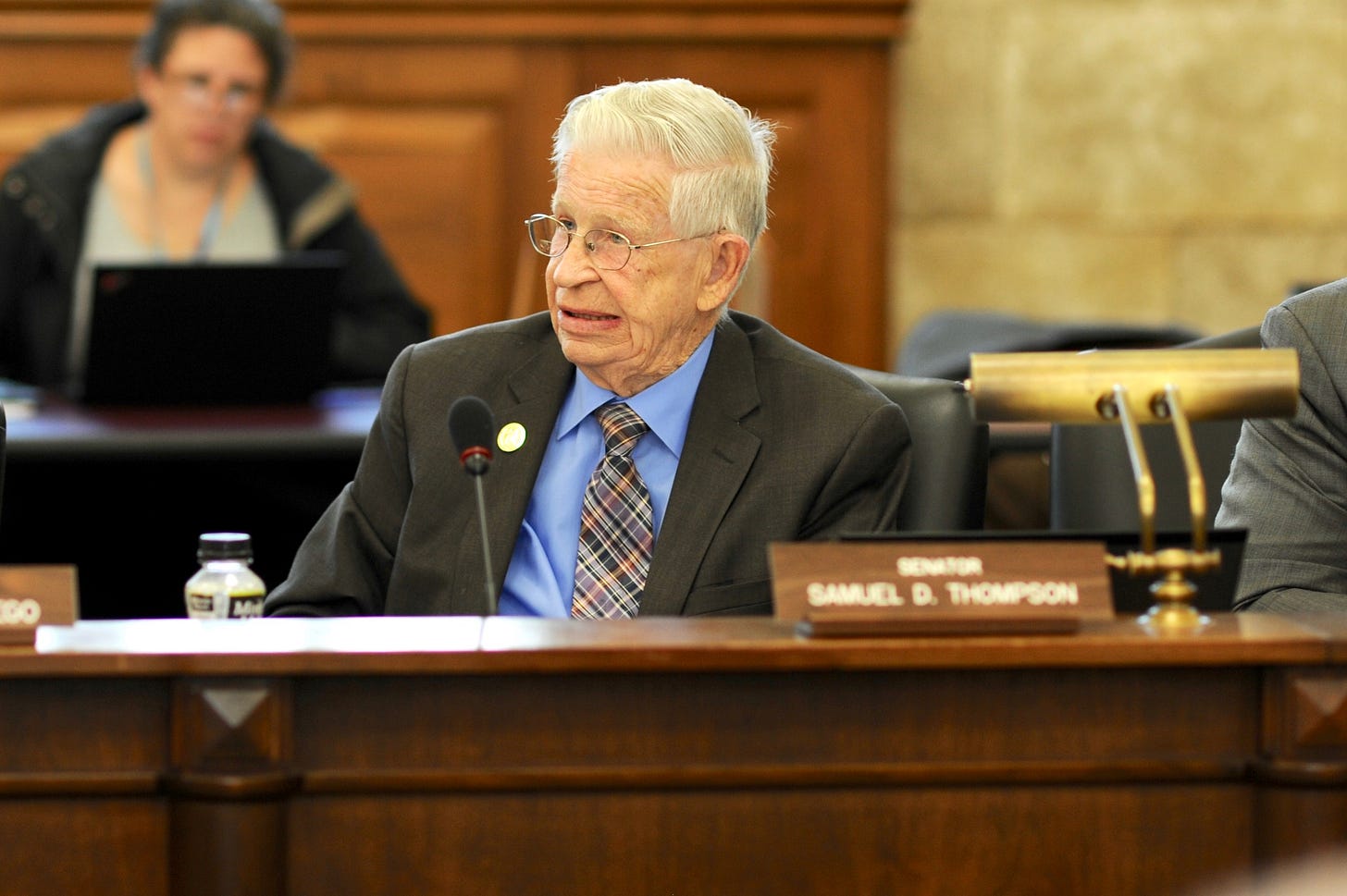Idaho Brings Back Firing Squad Executions?, Navy Builds Fleet of Bad Ships, Conclusive Evidence on Mask Effectiveness, 87-Year-Old Senator Seeks Re-Election (The Five for 02/28/23)
Hey, welcome to The Five.
Let’s dive into the news.
[one]
Well, the evidence is in…masks don’t do anything, according to the “gold standard” research authority on the subject.
Before the pandemic, clinical trials repeatedly showed little or no benefit from wearing masks in preventing the spread of respiratory illnesses like flu and colds. That was why, in their pre-2020 plans for dealing with a viral pandemic, the World Health Organization, the CDC, and other national public health agencies did not recommend masking the public. But once Covid-19 arrived, magical thinking prevailed. Officials ignored the previous findings and plans, instead touting crude and easily debunked studies purporting to show that masks worked.
The gold standard for medical evidence is the randomized clinical trial, and the gold standard for analyzing this evidence is Cochrane (formerly the Cochrane Collaboration), the world’s largest and most respected organization for evaluating health interventions. Funded in part by the National Institutes of Health and other nations’ health agencies, it’s an international network of reviewers, based in London, that has partnerships with the WHO and Wikipedia. Medical journals have hailed it for being “the best single resource for methodologic research” and for being “recognized worldwide as the highest standard in evidence-based healthcare.”
It has published a new Cochrane review of the literature on masks, including trials during the Covid-19 pandemic in hospitals and in community settings. The trials compared outcomes of wearing surgical masks versus wearing no masks, and also wearing surgical masks versus N95 masks. The review, conducted by a dozen researchers from six countries, concludes that wearing any kind of face covering “probably makes little or no difference” in reducing the spread of respiratory illness.
It may seem intuitive that masks must do something. But even if they do trap droplets from coughs or sneezes (the reason that surgeons wear masks), they still allow tiny viruses to spread by aerosol even when worn correctly—and it’s unrealistic to expect most people to do so. While a mask may keep out some pathogens, its inner surface can also trap concentrations of pathogens that are then breathed back into the lungs.
Whatever theoretical benefits there might be, in clinical trials the benefits have turned out to be either illusory or offset by negative factors. Oxford’s Tom Jefferson, the lead author of the Cochrane review, summed up the real science on masks: “There is just no evidence that they make any difference. Full stop.”
When the mask mandate was lifted in Missouri, but defied by St. Louis County, I spent the better part of two weeks trying to get arrested. I would simply walk into a store, and when they told me to put a mask on, I would explain local law was in conflict with state mandate…and ask for the business to call the police.
I would offer to stand outside and wait for the authorities to show up and arrest me…so I could challenge this mandate in court.
Every time…the employee would just shrug and say “no, don’t worry about it. Go ahead and shop.”
[two]
And speaking of COVID…
The Energy Department concluded with "low confidence" that the Covid-19 pandemic "likely" originated from a laboratory leak in Wuhan, China, according to a classified report delivered to key lawmakers on the House and Senate Intelligence committees, two sources with direct knowledge told NBC News.
Key lawmakers on the intelligence committees were briefed last month by the Office of the Director of National Intelligence about the classified report, the sources said.
The news was first reported Sunday by The Wall Street Journal.
However, a source cautioned that the Energy Department's conclusion was not being viewed as hugely significant among the intelligence community because of interagency disagreements about Covid’s origins.
The classified report maintains the consensus that Covid-19 was not the result of a Chinese bioweapon, a U.S. official said. In its assessment, the Energy Department also described the “likely” laboratory-related leak as an "accident," the official added.
Remember when you could have your social media accounts and other elements of your life canceled for saying what the Dept. of Energy just said?
[three]
An old method of execution may be returning.
Bryan Kohberger, the criminology Ph.D. candidate accused of stabbing four University of Idaho students to death last November, could face execution by firing squad if he is convicted of the murders and a bill introduced this week clears the Idaho state legislature.
Republican state Rep. Bruce Skaug introduced House Bill 186 on Wednesday, which would establish execution by firing squad as a backup to lethal injection.
Idaho, like several other states around the country, has struggled to procure the ingredients for lethal injections in recent years, most recently forcing the state to cancel the execution last year of a man who murdered two gold prospectors in 1985.
Skaug's bill calls for the director of the Idaho Department of Corrections to certify whether lethal injection is available no more than five days after a death warrant is issued. If lethal injection is not available, then the death row inmate would be executed by firing squad.
Kohberger, a 28-year-old Ph.D. student at Washington State University, allegedly snuck into a home near the University of Idaho in the early morning hours of Nov. 13 and stabbed four students to death.
A probable cause affidavit unsealed shortly after Kohberger's arrest in late December detailed the evidence against him, including that a knife sheath left at the scene had his DNA on it.
There have been four executions by firing squad since 1960, all in Utah, with the last execution taking place in 1996.
Setting aside the debate around the death penalty, lethal injection is particularly problematic as far as the success rate, with the highest percentage of “botched” executions, some of which result in the inmate suffering for hours before death.
[four]
So, is America sliding back into soft Monarchy status here…with “elected” officials
New Jersey state Sen. Samuel Thompson said Monday he’s leaving the Republican Party and plans to seek reelection this year as a Democrat.
Thompson, 87, said in a phone interview that he decided to leave the GOP after party leaders questioned his fitness for office because of his age.
“The betrayal by so many of my friends — that was too much for me,” he said. “I am not leaving my party. My party leadership has left me.”
Thompson’s departure would expand the Democrats’ edge in the state Senate from 24 to 25 seats in the 40-member chamber.
I don’t care at all that a State Senator switched parties, but how is it that our electoral system rewards a guy who’s trying to say in politics at AGE NINETY, which he would reach if winning this election.
Even if politicians like Thompson are “elected” (in the way that people randomly pick State Senators and Reps quickly to get to the national stuff on the ballot—which often means the luck of the draw), it certainly feels like political office is becoming more of a birthright than an elected position…especially if John Fetterman’s wife replaces him in the Senate this year.
This might not be “wrong,” but it can’t be healthy for democracy.
Update: Thompson will not seek re-election at age 87, due to a national outcry against him staying in office at such an advanced age.
[five]
Finally, the Navy wasted a LOT of money on bad ships…and are already being forced to rebuild.
The U.S. Navy appears to have learned from its costly lessons after cramming too much new technology onto warships and speeding them into production as it embarks on building new destroyers, which are the backbone of the fleet.
Military officials say they’re slowing down the design and purchase of its next-generation destroyers to ensure new technology like powerful lasers and hypersonic missiles are mature before pressing ahead on construction.
The Navy has learned “sometimes the hard way, when we move too fast we make big mistakes,” said Adm. Michael Gilday, chief of naval operations.\
The Navy may have learned “hard lessons,” but the PR here is an attempt to distract from the fact that American taxpayers will pick up the tab on these enormously costly mistakes…and it’s almost certain no incompetent members of the Navy’s leadership will face any real consequences.
Until the next one,
-sth








